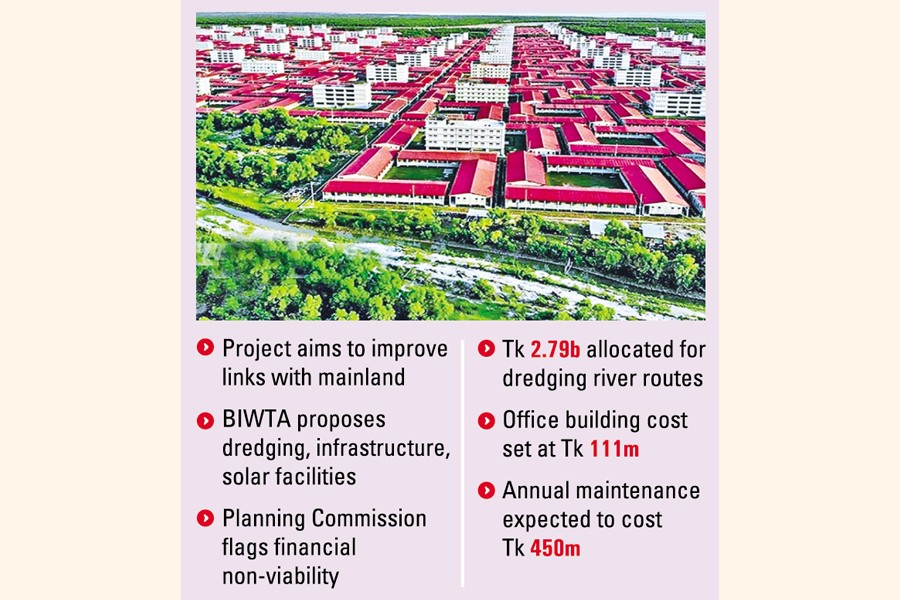IMPROVING RIVER LINKS WITH BHASANCHAR
Govt eyes Tk 3.95b project despite financial concerns

Published :
Updated :

The government has taken up a Tk 3.95 billion project to improve river links with Bhasanchar in Noakhali, where thousands of Rohingya refugees live, despite concerns over its financial viability.
The Bangladesh Inland Water Transport Authority (BIWTA) has placed a proposal to establish better riverine links between Bhasanchar and the mainland, including Chattogram and Hatiya Island, Planning Commission officials told The Financial Express on Tuesday.
The project is entirely government-funded and would draw from internal resources. It includes extensive river dredging and the construction of key infrastructure such as a jetty, office buildings, passenger and security sheds, a warehouse, and solar power facilities.
However, after reviewing the proposal, the Planning Commission raised red flags over the project's economic rationale.
"The Net Present Value (NPV) and Internal Rate of Return (IRR) figures are not supportive of the investment," said a Planning Commission official involved in the project review.
A major share of the project cost -- Tk 2.79 billion -- has been earmarked for dredging the Bhasanchar-Hatiya-Chattogram river route. BIWTA plans to carry out this work through Direct Procurement Method (DPM), bypassing competitive bidding.
Commission officials criticised the estimated dredging cost of Tk 300 per cubic metre as significantly higher than rates observed in similar ongoing projects, which typically range from Tk 150 to Tk 180. "This inflated rate raises serious questions about cost efficiency," one official said.
Other expenses flagged by the Commission include Tk 111 million for an office building at Bhasanchar, Tk 30 million for hiring a consultant -- which they deemed unnecessary for such work -- and Tk 90 million for dredged material disposal.
Also, a bloc allocation of Tk 259.4 million has been set aside for other infrastructure work, but without clear itemisation or cost justification. Once completed, the project is expected to require Tk 450 million annually to maintain the navigable waterway, according to BIWTA's estimate.
Despite the financial concerns, BIWTA argues the project is vital to maintain regular communication with Bhasanchar, which currently houses over 30,000 Rohingya refugees relocated from the congested camps in Cox's Bazar.
A senior BIWTA official, requesting anonymity, said, "To ensure reliable transportation and logistics for both humanitarian and administrative needs, we must implement this project."
The Planning Commission has asked BIWTA to provide detailed justifications and clarifications on several cost components before moving forward with the project approval process.
Since the Rohingya relocation began, the government has faced international scrutiny over Bhasanchar's accessibility and long-term viability. While humanitarian agencies have improved support services on the island, logistical challenges persist due to limited connectivity.
The proposed river link is being pitched as a strategic solution to address these gaps, but whether it will be approved in its current form remains uncertain.
kabirhumayan10@gmail.com


 For all latest news, follow The Financial Express Google News channel.
For all latest news, follow The Financial Express Google News channel.